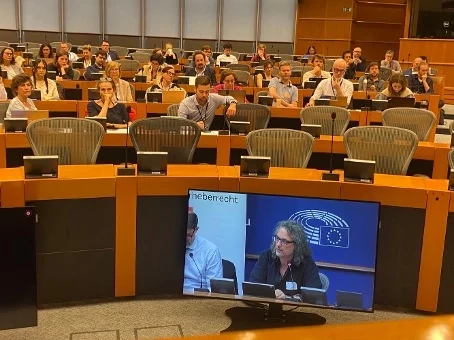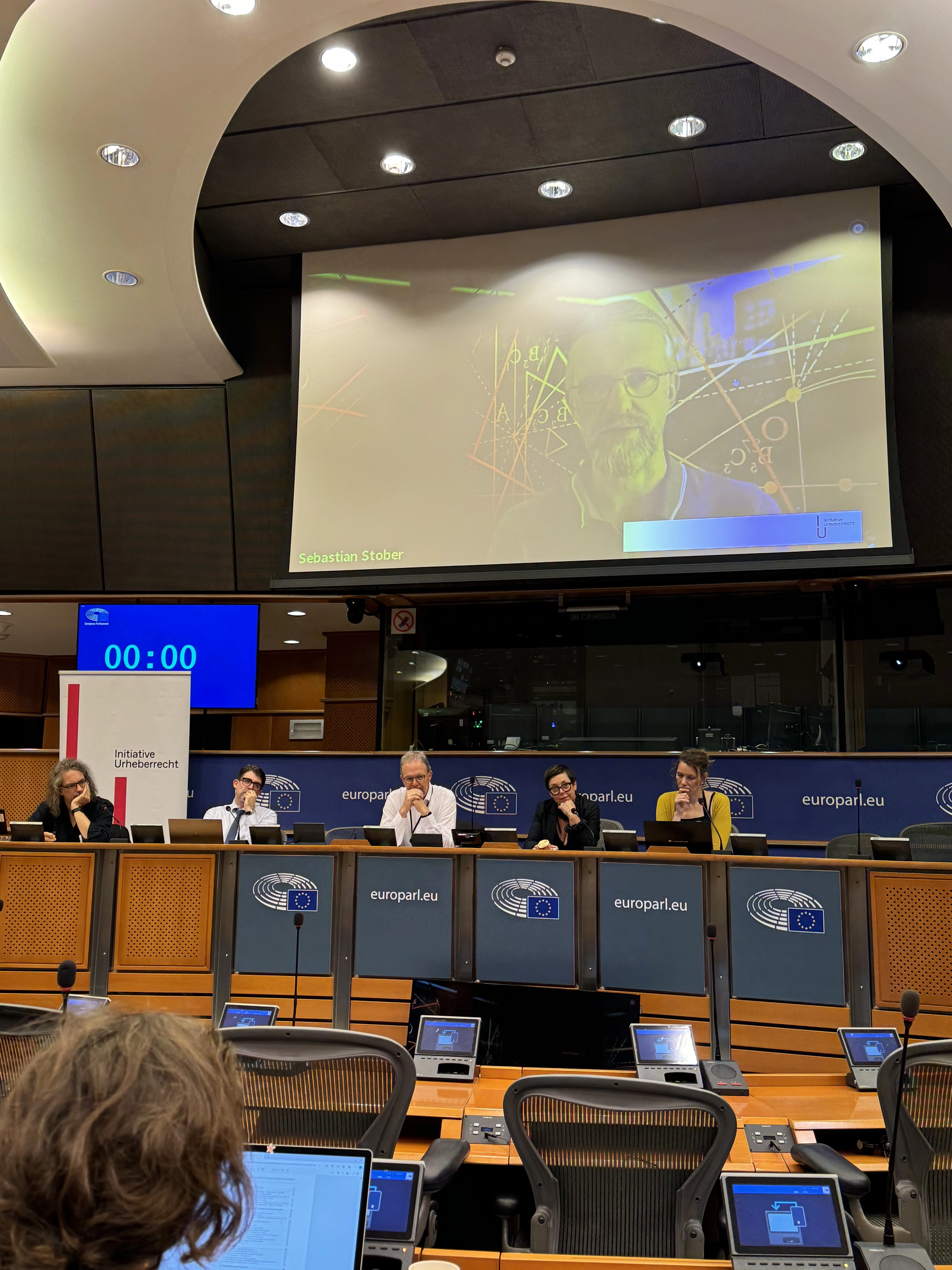Diskurs
Sonntag, 08.09.2024
Comment from Matthias Hornschuh
Snake Oil Regulation. Or: From the Head to the Toes
On Sept 5, 2024, the German authors’ rights umbrella Initiative Urheberrecht (IU) presented a groundbreaking interdisciplinary study at and to the European Parliament.
The study by Prof. Tim W. Dornis and Prof. Sebastian Stober, titled „Urheberrecht und Training generativer KI-Modelle - technologische und juristische Grundlagen / Copyright law and training of generative AI models - technological and legal foundations“, can be found here.
Towards the end of the event, it was up to me, as IU spokesperson, to formulate a summary and an outlook. My contribution is documented below.

Dear Mr. Voss, dear Members of Parliament, ladies and gentlemen,
what a moment. When you commission a study like this, you can only hope for solid results, but you cannot influence them. After all, it is a scientific paper, that‘s been commissioned.
Those guys delivered. You have already heard about it, and we are so happy.
Now, I am neither a legal scholar, nor a technological expert. I‘m a composer, author, and performer, and I represent thousands and thousands of colleagues. So it’s up to me to come to the political implications.
And to do that, I need to give you some basic orientation about the current situation.
We, the creators and performers of all kinds and in all sectors, we feel, we experience the impact, that the so called „AI Revolution“ has. We are experiencing it right now, immediately, existentially, less than two years after this revolution began.
You may have heard the German term „Zeitenwende“. For us creators, for the authors and performers, this is yet another Zeitenwende: Times are changing.
This is not, or at least not in the first place, a question of embracing or rejecting a (after all not so) new technology. I am talking about changes in the market, in culture and in society that are not God-given. That do not unfold according to natural law.
These changes are driven by corporations. By companies that are located in other legal and economic areas. And whose actions are largely tolerated due to political hesitation to act on European and national Level.
But justice delayed is justice denied.
Everything those corporations, like OpenAI/Microsoft, Anthropic, Amazon, Google, Meta, Suno, Udio … have to offer in the field of Generative Artificial Intelligence, every single bit of it, is based on the training data they collect and use to train their models.
These data - enormous, incredibly large amounts of data - contain our works, our recordings, our performances - our livelihood (… as well as everyone’s personal data). As of today, every single bit of it has been scraped and used for AI training, as long as it has been publically available, or at least as long as it has been online at all…
They took it without our consent, without compensation, and without giving credit to us.
You should be aware of the fact that for most creators, and definitely for my freelance colleagues, there is one simple truth:
⛔️ Our WORK is unpaid.
✅ It‘s our WORKS that make the money, when being performed or used in any way.
But those companies USED our works.
They used it to train a product, that is set to substitute us in our very own core markets. Which, by the way, raises interesting macro-economic questions...
This practice outlined above began more than a decade ago, and it continues.
In the meantime, however, the companies started running out of fresh data, copyrighted works included. And they had to realize that their hunger for large amounts of human-made data won‘t stop. Otherwise they run the risk of developing a model collapse. In case you haven’t heard of that so far, just think of it as the consequences of multi-generational incest. You get the picture.
Back to politics. When the companies started acting like that no one knew that there might be something like a DIGITAL SINGLE MARKET DIRECTIVE on the horizon. Or a TEXT AND DATA MINING exception being included in it.
They simply didn't care about the law or even about legitimacy.
They just went on: Move fast and break things.
They regarded and treated everything that was available in any way as if it were their property.
Well, it isn‘t.
It is Prof. Dornis‘ and Prof. Stober‘s merit to have shown very clearly that the time of this practice that has been trivialized as DISRUPTION is over.
- The training practice of generative AI models contains a large number of clear violations of copyright law.
- The training of generative AI models is not Text and Data Mining;
- and we can even bring the violations of the law that have occurred to national and European courts.
Now, THAT is revolutionary.
In January the computer scientist and philosopher Jürgen tante Geuter described his take on the overall situation as follows:
"I understand that OpenAI/Microsoft can't build ChatGPT within our legal framework. Well they could, but it would be prohibitively expensive (it already is now without paying the people who did the work). But I missed the part where that is our problem as a society. At least the German constitution has no article about "Do anything Big Business needs for them to make all the money while the people who did the work get nothing."
We‘re in trouble.
TDM is not applicable, and, by the way, the same might be true for the FAIR USE doctrine in the USA, but the companies continue to do, what they did since the 1990ies: They don‘t care. They don't care about the law or the common good, they prioritize their shareholder value, while insisting on making the world a better place through technology.
Some call that Snake Oil Business.
But Techology will not solve human-made problems; people have to do that. So, its up to politics.
Here in the rooms of the EU Parliament, I would therefore like to end with a warning: You policymakers cannot allow the gap between technological progress and democratic control to become too wide!
As long as we agree on democratic conditions and the rule of law, this means that our intellectual property must be protected and defended. This, in turn, is entirely in the spirit of the European Internal Market, as it was this House that approved a report on music streaming by a large majority in January of this year. This report states:
- A dysfunctional market endangers cultural diversity.
- Generative AI is amplifying these processes dramatically.
- Endangering diversity is a threat to European identity.
- Europe, however, is founded on UNITY IN DIVERSITY.
All in all, TDM is not a cure but, that will lead to a massive amount of trials on European ground, many of them being prepared in this very moment.
👉🏻 Creators, authors, journalists, performers and scientists as well need to be remunerated, ideally based on the usage of their respective works.
👉🏻 We need to be granted full participation in added value - to an appropriate, i.e. sustainable extent.
👉🏻 We may tackle the input or the output, or both of them. We’ll find out.
👉🏻 It must be possible for authors and performers, and for every rights holder, to say No to GenAI training.
👉🏻 And if we say No, i.e. if we decide to opt out, we need to know that we do have a chance to enforce our decision.
Dear members of the parliament, even if you don’t follow our authors’ rights based arguments, you should be aware of the fact, that GenAI is not and won’t ever be possible without our works (and your personal data).
It’s us who supply the fuel for these mega-machines; they are based on our work(s). If you believe in the importance of generative AI, then you would be well advised to consider this as a subject for single market regulation. If you do NOT believe in GenAI, then you would be much better advised to put an end to all this nonsense. Because it is damaging European economic power as well as European identity.
If Europe does not take on this task quickly and courageously, it will give up on incentivizing any kind of knowledge work. And then there will soon be no domestic market worth mentioning to defend. Because our economy, our economic ecosystem, is based on knowledge. And not on snake oil.
Thank you.
Pressekontakt: info@urheber.info
Mehr Diskurs zu diesem Thema
